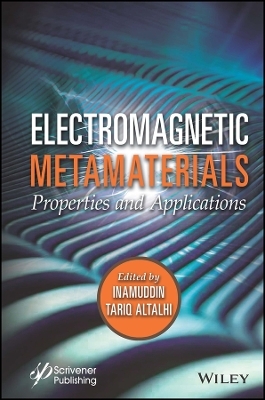
Electromagnetic Nanomaterials
Wiley-Scrivener (Verlag)
978-1-394-16622-0 (ISBN)
- Titel ist leider vergriffen;
keine Neuauflage - Artikel merken
Metamaterials have become a hot topic in the scientific community in recent years due to their remarkable electromagnetic properties. Metamaterials have the ability to alter electromagnetic and acoustic waves in ways that bulk materials cannot.
Electromagnetic Metamaterials: Properties and Applications discusses a wide range of components to make metamaterial-engineered devices. It gives an overview of metamaterials’ current stage of development in a variety of fields such as remote aerospace applications, medical appliances, sensor detectors and monitoring devices of infrastructure, crowd handling, smart solar panels, radomes, high-gain antennas lens, high-frequency communication on the battlefield, ultrasonic detectors, and structures to shield from earthquakes.
Audience
Researchers and engineers in electromagnetic and electrical engineering, classical optics, microwave and antenna engineering, solid-state physics, materials sciences, and optoelectronics.
Inamuddin, PhD, is an assistant professor at King Abdulaziz University, Jeddah, Saudi Arabia and is also an assistant professor in the Department of Applied Chemistry, Aligarh Muslim University, Aligarh, India. He has extensive research experience in the multidisciplinary fields of analytical chemistry, materials chemistry, electrochemistry, renewable energy and environmental science. He has published about 190 research articles in various international scientific journals, 18 book chapters, and 60 edited books with multiple well-known publishers. Tariq Altalhi is Head of the Department of Chemistry and Vice Dean of Science College at Taif University, Saudi Arabia. He received his PhD from the University of Adelaide, Australia in 2014. His research interests include developing advanced chemistry-based solutions for solid and liquid municipal waste management, and converting plastic bags to carbon nanotubes, and fly ash to efficient adsorbent material. He also researches natural extracts and their application in the generation of value-added products such as nanomaterials.
Preface xv
1 Metamaterial-Based Antenna and Absorbers in THz Range 1
M. R. Nigil and R. Thiruvengadathan
1.1 Introduction 2
1.2 Design Approach 9
1.3 Applications 11
1.4 Conclusion 24
2 Chiral Metamaterials 33
Wasefa Begum, Monohar Hossain Mondal, Ujjwal Mandal and Bidyut Saha
2.1 Introduction 34
2.2 Fundamentals of Chiral Metamaterials and Optical Activity Control 35
2.3 Construction of Chiral Metamaterial 36
2.4 Applications 40
2.5 Conclusion and Future Perspective 46
3 Metamaterial Perfect Absorbers for Biosensing Applications 53
Habibe Durmaz and Ahmet Murat Erturan
3.1 Introduction 54
3.2 Conclusion and Future Work 76
4 Insights and Applications of Double Positive Medium Metamaterials 85
Anupras Manwar, Tanmay Bhongade, Prasad Kulkarni, Ajinkya Satdive, Saurabh Tayde, Bhagwan Toksha, Aniruddha Chatterjee and Shravanti Joshi
4.1 Introduction 86
4.2 Insights on the Electromagnetic Metamaterials 87
4.3 Applications of DPS Metamaterials 89
4.4 Conclusion 96
5 Study on Application of Photonic Metamaterial 101
Anupama Rajput and Amrinder kaur
5.1 Introduction 101
5.2 Types of Metamaterials 102
5.3 Negative Index Metamaterial 104
5.4 Terahertz Metamaterials 105
5.5 Plasmonic Materials 107
5.6 Applications 110
5.7 Conclusion 113
6 Theoretical Models of Metamaterial 119
Hira Munir and Areeba Kashaf
6.1 Introduction 120
6.2 Background of Metamaterials 121
6.3 Theoretical Models of Metamaterials 122
6.4 Conclusion 133
7 Frequency Bands Metamaterials 137
D. Vasanth Kumar, N. Srinivasan, A. Saravanakumar, M. Ramesh and L. Rajeshkumar
7.1 Introduction 138
7.2 Frequency Bands Metamaterials 138
7.3 Penta Metamaterials 147
7.4 Reconfigurable Metamaterials for Different Geometrics 150
7.5 Conclusion 154
8 Metamaterials for Cloaking Devices 165
M. Rizwan, M. W. Yasin, Q. Ali and A. Ayub
8.1 Introduction 165
8.2 What is Cloaking and Invisibility? 166
8.3 Basic Concepts of Cloaking 167
8.4 Design and Simulation of Metamaterial Invisibility Cloak 168
8.5 Types of Cloaking 170
8.6 Cloaking Techniques 178
8.7 Conclusion 181
9 Single Negative Metamaterials 185
M. Rizwan, U. Sabahat, F. Tehreem and A. Ayub
9.1 Introduction 185
9.2 Classification of Metamaterials 187
9.3 Types of Metamaterials 189
9.4 Different Classes of Electromagnetic Metamaterials 192
9.5 Applications 201
9.6 Conclusion 203
10 Negative-Index Metamaterials 205
Rajesh Giri and Ritu Payal
10.1 Introduction 205
10.2 The Journey from Microwave Frequency to Electromagnetic Radiation 206
10.3 Experimentation to Justify Negative Refraction 208
10.4 Electromagnetic Response of Materials 211
10.5 Application of NIMs 213
10.6 Conclusions 214
11 Properties and Applications of Electromagnetic Metamaterials 219
Km. Rachna and Flomo L. Gbawoquiya
11.1 Introduction 220
11.2 Hyperbolic Metamaterials 226
11.3 Properties of Metamaterials 227
11.4 Application of Metamaterials 230
11.5 Single Negative Metamaterials 233
11.6 Hyperbolic Metamaterials 234
11.7 Classes of Metamaterials 237
11.8 Electromagnetic Metamaterials 238
11.9 Terahertz Metamaterials 241
11.10 Photonic Metamaterials 243
11.11 Tunable Metamaterial 244
11.12 Types of Tunable Metamaterials 245
11.13 Nonlinear Metamaterials 248
11.14 Absorber of Metamaterial 250
11.15 Acoustic Metamaterials 251
12 Plasmonic Metamaterials 261
M. Rizwan, A. Ayub, M. Sheeza and H. M. Naeem Ullah
12.1 Introduction 261
12.2 Negative Refraction and Refractive Indexes 263
12.3 Fundamentals of Plasmonics 265
12.4 Types of Plasmonics Metamaterials 270
12.5 Applications of Plasmonics Metamaterials 276
12.6 Conclusion 282
13 Nonlinear Metamaterials 287
M. Rizwan, H. Hameed, T. Hashmi and A. Ayub
13.1 Introduction 287
13.2 Nonlinear Effects in Metamaterials 290
13.3 Design of Nonlinear Metamaterials 292
13.4 Nonlinear Properties of Metamaterials 295
13.5 Types of Nonlinear Metamaterials 297
13.6 Applications 302
13.7 Overview of Nonlinear Metamaterials 304
13.8 Conclusion 304
14 Promising Future of Tunable Metamaterials 309
Tanveer Ahmad Wani and A. Geetha Bhavani
14.1 Introduction 310
14.2 Tuning Methods 313
14.3 Types of Tunable Metamaterials 315
14.4 Significant Developments 316
14.5 Future 318
14.6 Conclusion 320
15 Metamaterials for Sound Filtering 327
Sneha Kagale, Radhika Malkar, Manishkumar Tiwari and Pravin D. Patil
15.1 Introduction 327
15.2 Acoustic Metamaterials 330
15.3 Phononic Crystals 333
15.4 Metamaterials for Sound Filtering 334
15.5 Conclusion 337
16 Radar Cross-Section Reducing Metamaterials 341
Samson Rwahwire and Ivan Ssebagala
16.1 Introduction 341
16.2 Radiodetection and Ranging 344
16.3 RADAR Cross-Section 345
16.4 Conclusion and Outlook 358
References 359
Index 363
| Erscheinungsdatum | 11.10.2023 |
|---|---|
| Sprache | englisch |
| Gewicht | 662 g |
| Themenwelt | Technik ► Elektrotechnik / Energietechnik |
| Technik ► Maschinenbau | |
| ISBN-10 | 1-394-16622-2 / 1394166222 |
| ISBN-13 | 978-1-394-16622-0 / 9781394166220 |
| Zustand | Neuware |
| Haben Sie eine Frage zum Produkt? |
aus dem Bereich


